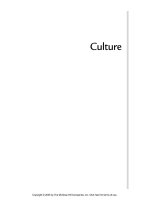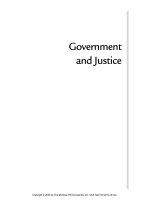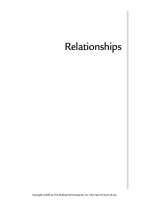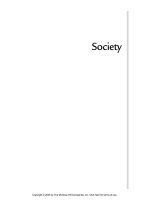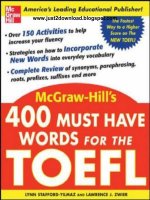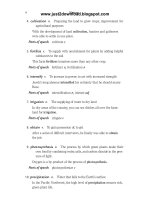Mcgraw Hill 400 Must Have Words For The Toefl - Society
Bạn đang xem bản rút gọn của tài liệu. Xem và tải ngay bản đầy đủ của tài liệu tại đây (1.87 MB, 30 trang )
Society
Copyright © 2005 by The McGraw-Hill Companies, Inc. Click here for terms of use.
This page intentionally left blank.
LESSON
Anthropology
Target Words
1.
assimilate
6.
relic
2.
cremation
7.
rite
3.
domesticate
8.
ritually
4.
folklore
9.
saga
5.
fossilize
10.
vestige
Definitions and Samples
1.
assimilate v.
To consume and incorporate; to become similar
Not all of the overseas students could assimilate into the rigidly
controlled school.
Usage tips
Assimilate is often followed by into.
Parts of speech
assimilation
n
2.
cremation n.
The act of burning the dead
Cremation is particularly common in Japan, where land for burial is
very limited.
Parts of speech
cremate
v
3.
domesticate v.
To make something suitable for being in a home
The Barnes family hoped to domesticate the tiger, but their neigh-
bors were skeptical.
14
Copyright © 2005 by The McGraw-Hill Companies, Inc. Click here for terms of use.
Usage tips
The object of domesticate is usually a plant or animal.
Parts of speech
domestic
adj
4.
folklore n.
Traditional myths of a people transmitted orally
Through folklore, archaeologists have learned about the migration
of Native Americans in North America.
Parts of speech
folkloric
adj
5.
fossilize v.
To become preserved in clay or stone or ash after death, so
that a natural record is left of the original organism; to become rigid
and stuck in old ways
The dinosaur eggs had fossilized over thousands of years.
Parts of speech
fossilization
n,
fossil
n
6.
relic n.
Something left from a long-ago culture, time period, or person
Relics of the war can still be found in the sand dunes along this
shore.
7.
rite n.
A ceremony meant to achieve a certain purpose
Many cultures have fertility rites that supposedly make it more
likely for women to bear children.
8.
ritually adv.
As part of a traditional ceremony or habit
The children ritually kissed their parents on the cheek before bed.
Parts of speech
ritual
n,
ritual
adj
9.
saga n.
A long story about important events long ago
Many American families tell sagas about their ancestors’ arrival in
the United States.
10.
vestige n.
A visible trace that something once existed
The wilted flowers were the only vestige of their romantic weekend.
68
Society
TOEFL Prep I
Choose the word from the list that is closest in mean-
ing to the underlined part of each sentence.Write it in the blank.
assimilate cremation domesticate folklore ritual
1.
In many cultures around the world, young boys are cir-
cumcised in a traditional
ceremony.
2.
It is difficult to tame a bird that was born in the wild.
3.
Based on the oral legends about the fire, researchers es-
timate that about half of the townspeople died in the
blaze.
4.
After the burning of the body, the remaining bits of
bone are transferred to a large urn.
5.
Her husband could never fit into her family’s way of
life.
TOEFL Prep II
Write the best word next to each definition. Use
each word only once.
fossilize relic rite saga vestige
1.
to harden after death
2.
a customary act
3
. a memento
4.
something remaining from the past
5.
a long story
TOEFL Success
Read the passage to review the vocabulary you
have learned. Answer the questions that follow.
The aborigines of Australia may have been some of the first people on the
planet. Recent discoveries of relics, including stone tools, show that
Anthropology
69
humans lived near Penrith, New South Wales, about 47,000 years ago.
Australian aborigines migrated from northern lands by sea, when the
water passages were narrower than they are today. This is the first
evidence of sea travel by prehistoric humans.The saga of this
water passing survives in modern-day aboriginal folklore. To
put this in perspective, remember that 50,000 years ago,
humans were nomadic. Early aborigines did not cultivate
crops, and in Australia at the time there were no animals that
could be domesticated. No one knows how long it took
aboriginal people to reach Australia, but archaeologists are
searching through ancient campsites for vestiges of their early lifestyle.
Fossilized remains indicate that these nomadic people not only gathered
food from the land, but they also subsisted on meat from large animals
that no longer exist today. As part of their hunting tradition, aborigines
ritually
covered themselves in mud to mask their own scent or for
camouflage. Aboriginal society marked the major events of life with rites
such as circumcision, marriage, and cremation. Older people were revered
and cared for as great sources of wisdom. When Westerners arrived in
Australia in 1788, the 300,000 aborigines who lived there were not eager
to assimilate their ways. In the following years, disease, loss of land, and
loss of identity shaped the aborigines’ history perhaps as much as their
first prehistoric crossing from the north.
1.
Which sentence best expresses the essential information in this
passage?
a.
Australian aborigines were some of the Earth’s first people.
b.
White explorers did not respect aboriginal culture.
c.
Australian aborigines probably migrated from Africa.
d.
The organization and functioning of aboriginal society is mostly
unknown.
2.
In this passage, the word ritually is closest in meaning to
a.
regularly
b.
ignorantly
c.
superstitiously
d.
dramatically
70
Society
Bonus Structure—
To put this in
perspective
means “to give
some background
information.”
Lesson 14
Anthropology
TOEFL Prep I
1.
ritual
2.
domesticate
3.
folklore
4.
cremation
5.
assimilate
TOEFL Prep II
1.
fossilize
2.
rite
3.
relic
4.
vestige
5.
saga
TOEFL Success
1.
a
2.
a
Anthropology
71
LESSON
Social Inequality
Target Words
1.
amend
6.
discriminate
2.
biased
7.
notion
3.
burden
8.
oppress
4.
counter
9.
paradigm
5.
de facto
10.
prejudiced
Definitions and Samples
1.
amend v.
To change for the better
The residents voted to amend their neighborhood policy on fences.
Parts of speech
amendment
n
2.
biased adj.
Leaning unfairly in one direction
Her newspaper article was criticized for being heavily biased
toward the mayor’s proposal.
Parts of speech
bias
n
3.
burden n.
Something that is carried; a source of stress or worry
The donkey walked slowly under the burden of its heavy load.
The failing company faced the burden of bad debts and a poor
reputation.
Parts of speech
burden
v
15
Copyright © 2005 by The McGraw-Hill Companies, Inc. Click here for terms of use.
4.
counter v.
To act in opposition to; to offer in response
The hockey player countered the punch with a smashing blow from
his hockey stick.
Jane countered every accusation with a specific example of her
achievements.
Parts of speech
counter
n,
counter
adj
5.
de facto adj.
Truly doing a job, even if not officially
Popular support established the Citizens Party as the de facto
government.
Parts of speech
de facto
adv
6.
discriminate
To choose carefully among options
The governor wisely discriminated between urgent issues and those
that could wait.
Parts of speech
discriminatory
adj,
discriminate
adj
7.
notion n.
A belief; a fanciful impulse
The notion that older office equipment is unreliable is inaccurate.
One morning, she suddenly took the notion to paint her kitchen red.
Usage tips
Notion can be followed by a that clause or a to phrase.
8.
oppress v.
To keep down by force; to weigh heavily on
Factory management oppressed workers through intimidation.
Parts of speech
oppression
n
9.
paradigm n.
A pattern or model; a set of assumptions
The usual paradigm for economic growth in developed countries
does not apply to some poor nations.
Usage tips
Paradigm is often followed by for.
Social Inequality
73
10.
prejudiced adj.
Causing to judge prematurely and unfairly
Many consumers are prejudiced against commercial goods made in
third-world countries.
Parts of speech
prejudice
v,
prejudice
n
TOEFL Prep I
Complete each sentence by filling in the blank with
the best word from the list. Change the form of the word if necessary.
Use each word only once.
biased counter de facto notion paradigm
1.
During the trial, the defense lawyer __________ each claim with an
opposite charge.
2.
The basketball coach was naturally __________ toward the taller
players.
3.
After we saw the fancy car that the Jacobses bought, we gave
up the __________ that they could not afford the basic things in
life.
4.
The battle was successful, as judged by the prevailing __________ of
that era.
5.
Even though Jovie was a cleaner, not a nanny, she was the baby’s
__________ caregiver because his parents worked so many hours.
TOEFL Prep II
Find the word or phrase that is closest in mean-
ing to the opposite of each word in the left-hand column. Write the
letter in the blank.
1. amend (a) relieve
2. burden (b) allow to operate freely
3. oppress (c) leave as is
4. indiscriminately (d) unbiased
5. prejudiced (e) by making careful choices
74
Society
TOEFL Success
Read the passage to review the vocabulary you
have learned. Answer the questions that follow.
Nelson Mandela devoted his life to fighting prejudice in South Africa.
Mandela traveled his state, organizing a fight against discriminatory laws
and racial bias. He encouraged civil disobedience as a tool against the
oppression of Blacks. As deputy president of the African National
Congress, Mandela encouraged his fellow citizens to challenge the
prevailing paradigm of power. Mandela believed that prejudice burdened
not only the oppressed, but also the oppressors.
The government countered Mandela’s activities with a criminal
conviction. Still, Mandela’s de facto leadership gained him respect and
authority among his fellow citizens. Mandela’s courage
and popularity worried the ruling class, who did not want
to share power. What’s more, they refused to amend
the
state’s laws. So when Mandela returned from an overseas
trip to gain support for his cause in 1962, he was arrested,
jailed, and sentenced to life in prison for various crimes.
This only fueled Mandela’s notions about inequality
and justice. He took his demands to jail, where he
demanded the same dress and safety gear for Black prisoners as for White
prisoners. After 28 years in prison, Mandela was released, returning
immediately to public life. In 1994, he was elected the president of South
Africa.
1.
Which of the following best expresses the essential information of
this passage?
a.
Nelson Mandela used illegal means to achieve his ends.
b.
Nelson Mandela fought prejudice in South Africa.
c.
Nelson Mandela inspired Blacks around the world.
d.
Nelson Mandela was driven primarily by his religious beliefs.
2.
In the passage, the word amend is closest in meaning to
a.
ignore
b.
write down
c.
change
d.
discuss
Social Inequality
75
Bonus Structure—
The ruling class
means those who
held power mostly
because of the
families they were
born into.
Lesson 15
Social Inequality
TOEFL Prep I
1.
countered
2.
biased
3.
notion
4.
paradigm
5.
de facto
TOEFL Prep II
1.
c
2.
a
3.
b
4.
e
5.
d
TOEFL Success
1.
b
2.
c
76
Society


